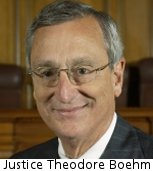10/7/2010
Indiana Supreme Court Approves Drug Search of Cars in Public LotsIndiana Supreme Court sees no problem with drug searches of any car parked in a public lot.

Cars in public parking lots can be searched at any time by police with drug sniffing dogs, the Indiana Supreme Court ruled last week. The precedent was handed down in the case of James S. Hobbs IV who was arrested on March 13, 2009. State troopers had an arrest warrant for Hobbs and were waiting for him across the street from the Pizza Hut where the suspect worked. At 9:15pm, Hobbs left the restaurant and placed an object in his car, but the police were not able to grab Hobbs before he returned to the restaurant.
While Hobbs was placed under arrest inside the Pizza Hut, a drug dog was used to search his car. Marijuana was found. A trial court ruled the search illegal because it was conducted without a warrant. The court of appeals disagreed, as did a divided supreme court.
Hobbs had argued that because he was in the restaurant under arrest, the usual "officer safety" excuse to search a vehicle did not apply, nor could the necessity of preserving evidence be used to excuse the lack of a search warrant because the arrest warrant for Hobbs had nothing to do with drug charges.
"Most cases addressing the automobile exception arise in the context of an arrest or an investigatory stop of a motorist that gives rise to probable cause, but the exception is grounded in the mobility of the vehicle and its location in a public area, not on whether the issue arises in the context of an arrest or a traffic stop," Justice Theodore R. Boehm wrote for the majority. "Under the exception, an operational vehicle is inherently mobile, whether or not a driver is behind the wheel or has ready access.... It is well settled that a dog sniff is not a search protected by the Fourth Amendment. Accordingly, no degree of suspicion is required to summon the canine unit to the scene to conduct an exterior sniff of the car or to conduct the sniff itself."
Justices Frank Sullivan, Jr. and Robert D. Rucker did not think merely establishing that a car was "readily mobile" and "operational" justified the search, based on his reading of precedent.
"In every one of the cases cited by the court and in all of the automobile exception cases that I have reviewed, law enforcement officers' initial contact with a suspect occurs either during a lawful traffic stop or at least in close proximity to the vehicle," Sullivan wrote in the dissent. "Said slightly differently, in all of the cases where the automobile exception to the warrant requirement has been held available, the vehicle in question has been not only readily mobile and operational but also in close proximity to the suspect at the time of initial contact with the police."
Because in this case Hobbs was nowhere near his vehicle when the search took place, police should have taken the time to obtain a warrant, Sullivan and Rucker argued.
A copy of the decision is available in a 200k PDF file at the source link below.


